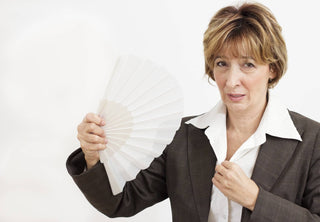Your face burns, your heart races, you start to sweat. When you’re having a hot flash, you know.
But you’re not alone. Eighty five percent of women in the U.S. experience hot flashes as they approach menopause, and between 20-50% continue to experience them for up to a decade or longer!
So what can you do to prevent hot flashes from disrupting your life?
According to a new study by researchers at the University of Pittsburgh published in Menopause, the journal of the North American Menopause Society, losing weight may help reduce those hot flash flare-ups.
Researchers recruited 40 overweight and obese peri- and postmenopausal women who wanted to lose weight and reported experiencing four or more hot flashes daily. The women were divided into two groups: the first group took part in a six-month weight loss program, and the second group was informed that they were on a wait list for a weight loss program.
“Those in the weight loss group experienced fewer hot flashes, with greater weight loss being associated with respectively fewer hot flashes.”
Weight measurements were taken for all participants. The women in the weight loss group attended weight loss sessions where they were given calorie goals, exercise goals, and instructed on behavioral strategies such as stimulus control and how to monitor weight and calories.
Through the course of the study, all participants kept diaries and responded to questionnaires to keep track of their hot flashes. Hot flash frequency was also measured periodically via a physiological sensor that measured skin temperature.
When the 6-month period concluded, weight measurements were taken again.
Those in the weight loss group had lost an average of 19 pounds and nearly 5% body fat. They also experienced fewer hot flashes, with greater weight loss being associated with respectively fewer hot flashes.
Lead author Rebecca Thurston, professor of psychiatry at the University of Pittsburgh School of Medicine, concluded, “
The Bottom Line
Hot flashes aren’t just uncomfortable – they negatively impact your quality of life by disrupting sleep and causing stress, anxiety, or even depression.
Conventional treatment of these symptoms was hormone replacement therapy (HRT), where estrogen and/or progesterone/progestin are taken to replenish what your body no longer produces enough of. Unfortunately, a growing body of research shows that HRT can increase the risk of endometrial cancer, breast cancer, heart disease, and blood clots and stroke, so while effective, fewer women are electing to resort to HRT.
Other more natural treatments include supplementing with botanicals like black cohosh, red clover, or vitamin E, which some women report help reduce hot flashes, but studies on long-term efficacy are few.
So if losing weight is a low-risk way to combat one of the worst symptoms of menopause, why the heck not?
The study authors write that obesity is directly associated with the frequency of hot flashes, and a different study by Stanford researchers finds that one of the major causes of obesity is a lack of exercise. Over the past two decades, the percentage of women who don’t exercise more than doubled, from 19% to 52%, and the number of obese women grew more than 10%, with little evidence to show that we’re eating more calories now than before. Is it any wonder, then, that these hot flashes are affecting so many of us?
It’s obvious we need to move more.
The added bonus is that getting more exercise won’t just help with weight loss and hot flashes. It’ll also help with other age-related issues we face alongside menopause, like this study that shows just 20 minutes of brisk walking daily prevents loss of mobility and this study that suggests moderate to high intensity workouts are essential for a longer life.
Exercise plays a key role at every stage in our lives: whether we’re aiming to reduce stress during motherhood, maintain our weight as we age, manage hot flashes during menopause or maintain our mental and physical health with advancing age. Looking better, feeling better, moving better, and living better – who doesn’t want that?

